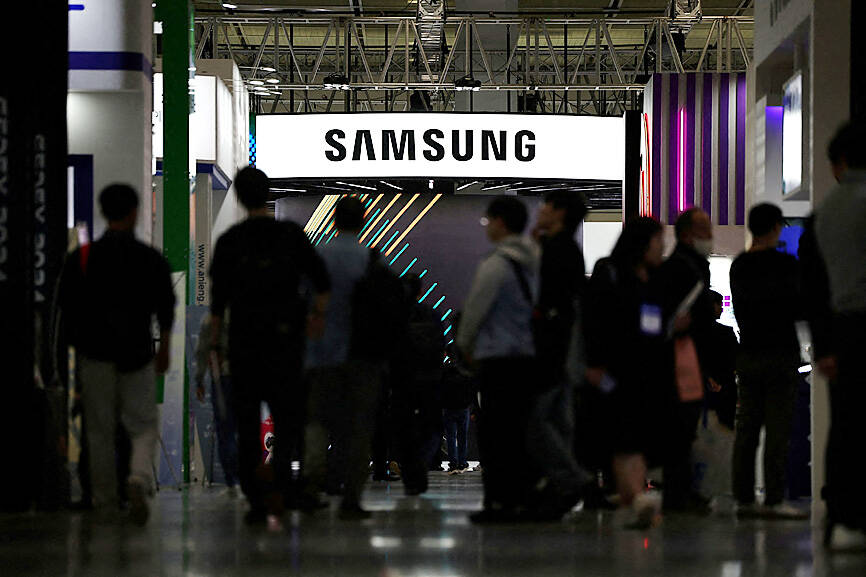Samsung Electronics Co and Texas Instruments Inc completed final agreements to get billions of US dollars of government support for new semiconductor plants in the US, cementing a major piece of US President Joe Biden administration’s CHIPS and Science Act initiative.
Under binding agreements unveiled Friday, Samsung would get as much as US$4.75 billion in funding, while Texas Instruments stands to receive US$1.6 billion — money that would help them build facilities in Texas and Utah. The final deals mean the chipmakers can begin collecting the funding when their projects hit certain benchmarks.
Though the terms of Texas Instruments’ final agreement is in line with a preliminary deal, Samsung is getting substantially less than originally expected.

Photo: Reuters
“Our mid-to-long-term investment plan has been partially revised to optimize overall investment efficiency,” Samsung said in a statement, indicating that its project would not be as large as originally planned.
The CHIPS Act, signed into law by Biden in 2022, set aside US$39 billion in grants, loans and loan guarantees worth US$75 billion and 25 percent tax credits. It aims to boost US semiconductor production after decades of manufacturing shifting abroad.
Officials have divvied up most of that money, with US Secretary of Commerce Gina Raimondo racing to finalize as many deals as possible before leaving office.
The latest awards round out the program’s biggest grants, helping ensure that there is comprehensive local production of semiconductors. Texas Instruments is the largest maker of analog chips and embedded processors. Samsung is the world’s top maker of memory chips and a major provider of advanced outsourced production for other companies.
China has boosted its manufacturing capacity of analog and embedded chips, attempting to be more self-reliant in this vital area. That has made it all the more important for the US to do the same.
In a separate announcement, the US Department of Commerce also firmed up plans to deliver US$407 million in direct funding to Amkor Technology Inc. The money would support that company’s investment in Arizona, where it is building more capacity for what is called advanced packaging.
Texas Instruments’ award would help fund three new large plants: two in Sherman, Texas, and one in Lehi, Utah. They would create 2,000 new positions for the Dallas-based company, it said.
Samsung is expanding its facilities in central Texas. That would include work on so-called logic chips — components that act as the brains of systems — and a research and design facility in Taylor. The company also would be expanding an existing site in Austin.
Texas Instruments has said it plans to spend about US$40 billion to build five new US factories: one in Utah and four in Texas. The government funding supports just the first two Texas factories, since officials are prioritizing projects that would be in production by the end of the decade.

UNCERTAINTY: Innolux activated a stringent supply chain management mechanism, as it did during the COVID-19 pandemic, to ensure optimal inventory levels for customers Flat-panel display makers AUO Corp (友達) and Innolux Corp (群創) yesterday said that about 12 to 20 percent of their display business is at risk of potential US tariffs and that they would relocate production or shipment destinations to mitigate the levies’ effects. US tariffs would have a direct impact of US$200 million on AUO’s revenue, company chairman Paul Peng (彭雙浪) told reporters on the sidelines of the Touch Taiwan trade show in Taipei yesterday. That would make up about 12 percent of the company’s overall revenue. To cope with the tariff uncertainty, AUO plans to allocate its production to manufacturing facilities in

TAKING STOCK: A Taiwanese cookware firm in Vietnam urged customers to assess inventory or place orders early so shipments can reach the US while tariffs are paused Taiwanese businesses in Vietnam are exploring alternatives after the White House imposed a 46 percent import duty on Vietnamese goods, following US President Donald Trump’s announcement of “reciprocal” tariffs on the US’ trading partners. Lo Shih-liang (羅世良), chairman of Brico Industry Co (裕茂工業), a Taiwanese company that manufactures cast iron cookware and stove components in Vietnam, said that more than 40 percent of his business was tied to the US market, describing the constant US policy shifts as an emotional roller coaster. “I work during the day and stay up all night watching the news. I’ve been following US news until 3am

COLLABORATION: Given Taiwan’s key position in global supply chains, the US firm is discussing strategies with local partners and clients to deal with global uncertainties Advanced Micro Devices Inc (AMD) yesterday said it is meeting with local ecosystem partners, including Taiwan Semiconductor Manufacturing Co (TSMC, 台積電), to discuss strategies, including long-term manufacturing, to navigate uncertainties such as US tariffs, as Taiwan occupies an important position in global supply chains. AMD chief executive officer Lisa Su (蘇姿丰) told reporters that Taiwan is an important part of the chip designer’s ecosystem and she is discussing with partners and customers in Taiwan to forge strong collaborations on different areas during this critical period. AMD has just become the first artificial-intelligence (AI) server chip customer of TSMC to utilize its advanced

Six years ago, LVMH’s billionaire CEO Bernard Arnault and US President Donald Trump cut the blue ribbon on a factory in rural Texas that would make designer handbags for Louis Vuitton, one of the world’s best-known luxury brands. However, since the high-profile opening, the factory has faced a host of problems limiting production, 11 former Louis Vuitton employees said. The site has consistently ranked among the worst-performing for Louis Vuitton globally, “significantly” underperforming other facilities, said three former Louis Vuitton workers and a senior industry source, who cited internal rankings shared with staff. The plant’s problems — which have not